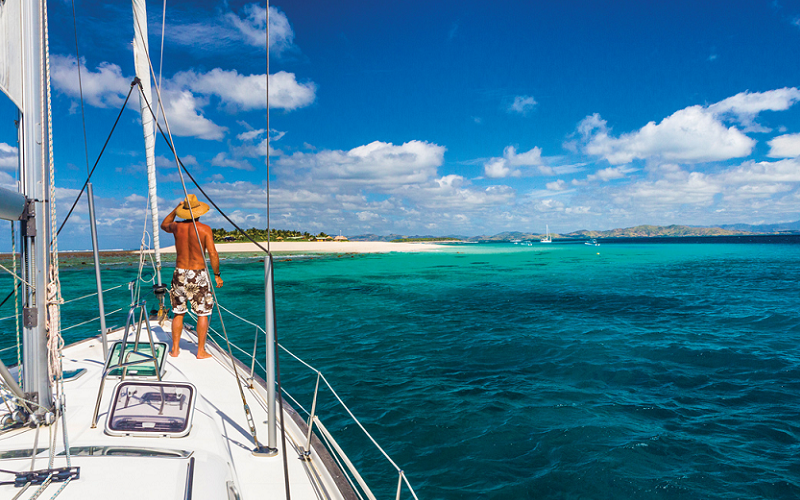
The gentle lapping of water against a boat, the rhythmic motion of the waves, and the challenge of harnessing the wind’s power to chart a course — sailing is as much a dance of precision as it is an adventure. But beyond the thrill and serenity it offers, sailing harbors deeper connections to the human psyche. Much like navigating through unpredictable waters, our minds often seek a state of fluidity and focus known as ‘cognitive flow.’ This state, where we’re both challenged and deeply engaged, is the epitome of mental immersion.
Contents
Understanding Cognitive Flow
The human mind is a wonder, capable of intense concentration and creativity, especially when immersed in tasks that are both challenging and enjoyable. This state of deep immersion, where one loses track of time and is completely engrossed in the activity, has been termed ‘cognitive flow’.
Definition and Origin of the Term
Cognitive flow, often just called “flow”, was coined by Mihaly Csikszentmihalyi, a Hungarian psychologist, in the late 20th century. He described it as the state where individuals are so involved in an activity that nothing else seems to matter. It’s a point where challenge and skill intersect, creating an experience that is intrinsically rewarding.
Characteristics of Being in “Flow”
Flow isn’t just about being engaged; it has specific characteristics that set it apart from other states of concentration or focus. These hallmarks provide a roadmap to understanding when and how we enter this coveted state.
Complete Concentration
When in flow, individuals experience an unwavering focus on the task at hand. External distractions fade away, and there’s a heightened sense of presence in the moment.
Sense of Timelessness
A common sensation among those in flow is a distorted perception of time. Hours might feel like minutes, and the outside world seems to fade away [1].
Intrinsic Reward
Activities that induce flow are rewarding in themselves. The sheer joy of doing becomes more significant than any external reward or outcome.
Match of Challenge and Skill
Flow occurs when the task at hand is neither too easy nor too hard. It’s the sweet spot where the challenge matches one’s skill level, pushing boundaries without inducing anxiety.
Benefits for Brain and Cognitive Health
Flow isn’t just a pleasant experience; it has tangible benefits for our cognitive health. Engaging in flow-inducing activities can lead to numerous positive outcomes.
Enhanced Creativity
The state of flow often sparks innovation and out-of-the-box thinking. The focused immersion allows the mind to make unique connections and come up with novel solutions.
Lower Levels of Stress
Engaging in flow activities acts as a form of meditation, reducing cortisol levels and promoting relaxation.
Improved Problem-Solving
When in flow, the brain operates at an optimal level, making it easier to tackle challenges and find solutions to problems.

Sailing as a Catalyst for Cognitive Flow
The vast, open seas have been a source of intrigue and exploration for centuries, beckoning adventurers to test their mettle against the unpredictable elements. While sailing can be seen as a physical challenge, it also offers a unique mental playground. The complexities and demands of navigating the waters bear a striking resemblance to the conditions that foster cognitive flow.
The Demands of Sailing
Sailing is not a passive experience; it requires a dynamic interplay of skill, attention, and adaptability. This intricate dance with nature places demands on the sailor that are eerily similar to the prerequisites of cognitive flow.
Attention to Detail
Successful sailing necessitates a keen eye for the subtle shifts in wind patterns, the gentle changes in wave motion, and the nuances of the boat’s behavior. This acute focus mirrors the complete concentration seen in flow states [2].
Adaptation to Changing Conditions
The sea is ever-changing. Calm waters can quickly turn turbulent, and winds may shift without warning. Sailors must be perpetually ready to adapt, ensuring their skills match the evolving challenges—a concept synonymous with the flow’s balance of skill and challenge.
Decision-Making Under Pressure
Sailing often presents scenarios where critical decisions need to be made swiftly. This urgency, paired with the need for precision, can propel sailors into a heightened state of focus and immersion.
How Sailing Mirrors Characteristics of Flow
Given the demands of sailing, it’s no surprise that many sailors recount experiences that mirror the hallmarks of cognitive flow. These moments on the water offer insights into how sailing and flow are intertwined.
Immersive Experience
Just as flow encapsulates one in the task, sailing often immerses individuals so deeply that all else fades away. The horizon, the rhythm of the boat, and the challenge of navigation become the sole focus.
Merging of Action and Awareness
In flow, one’s actions and consciousness become seamlessly intertwined. Sailing presents a similar melding, where every maneuver and decision feels instinctive, almost as if the sailor and the sea are one.
Flow thrives on immediate feedback, allowing one to adjust and refine their actions. Sailing provides this in abundance, with the boat’s response, the wind’s feedback, and the outcomes of navigational choices offering real-time insights [3].

Protecting Brain Health through Sailing
The rejuvenating rush of the sea breeze, the tactile feedback from the ropes, and the dance of strategy and instinct while navigating—all of these elements combine to make sailing a multifaceted experience. Beyond its alignment with cognitive flow, sailing offers a myriad of benefits that directly contribute to brain health and overall cognitive well-being. Diving into these benefits, we uncover how this age-old maritime activity can be a shield and nourishment for our neural circuits.
Physical Health Benefits and their Cognitive Impact
The relationship between physical health and cognitive well-being is well-established. Activities that stimulate the body invariably benefit the mind. Sailing, with its physical demands, offers a plethora of health advantages that echo in the corridors of our cognition.
Exercise and Endorphin Release
While it might appear serene from a distance, sailing is a full-body workout. From hoisting the sails to balancing the boat, sailors engage multiple muscle groups. This physical exertion releases endorphins—natural painkillers and mood elevators—which boost mood and cognitive clarity.
Fresh Air and Vitamin D
Sailing is an outdoor activity that exposes individuals to sunlight and fresh air. Sunlight aids in the production of Vitamin D, essential for brain function and mood regulation. Additionally, the influx of fresh, oxygen-rich air enhances cognitive performance and reduces mental fatigue [4].
Mental Well-being and Emotional Resilience
The mental demands of sailing not only stimulate cognitive flow but also fortify our emotional and psychological resilience. The sea, with its unpredictable temperament, teaches invaluable lessons in patience, perseverance, and adaptability.
Problem-Solving and Critical Thinking
Navigating through ever-changing sea conditions demands on-the-spot decision-making and problem-solving. Regularly engaging in such cognitive exercises sharpens the mind and fosters neural plasticity.
Stress Reduction and Meditation
The rhythmic motion of the waves and the vastness of the sea can have a meditative effect, grounding sailors in the present moment. This mindfulness reduces cortisol levels, alleviating stress and its detrimental effects on the brain.
Building Confidence
Successfully maneuvering a vessel and combating the challenges of the sea instills a sense of accomplishment and boosts self-esteem. This enhanced confidence translates to better mental health and well-being [5].
Building Social Connections and Teamwork
Humans are inherently social beings. Our cognitive health is often linked to the quality and quantity of our social interactions. Sailing, especially when done in teams or groups, offers a unique platform for social engagement.
Collaborative Skills
Team sailing or crewed boats require coordination, communication, and collaboration. These social interactions strengthen neural pathways and foster cognitive agility.
Overcoming challenges at sea, celebrating successes, or simply sharing the serenity of a sunset on the horizon can create lasting bonds. Such deep connections have been shown to improve mental health and reduce the risk of cognitive decline.
References
[1] How can sailing help you achieve a flow state of mind?
[2] Sailing: Cognition, action, communication
[3] Introduction: Sailing Minds
[4] Sailing Across the Atlantic: An Exploration of the Psychological Experience
[5] What Is Flow in Positive Psychology?
